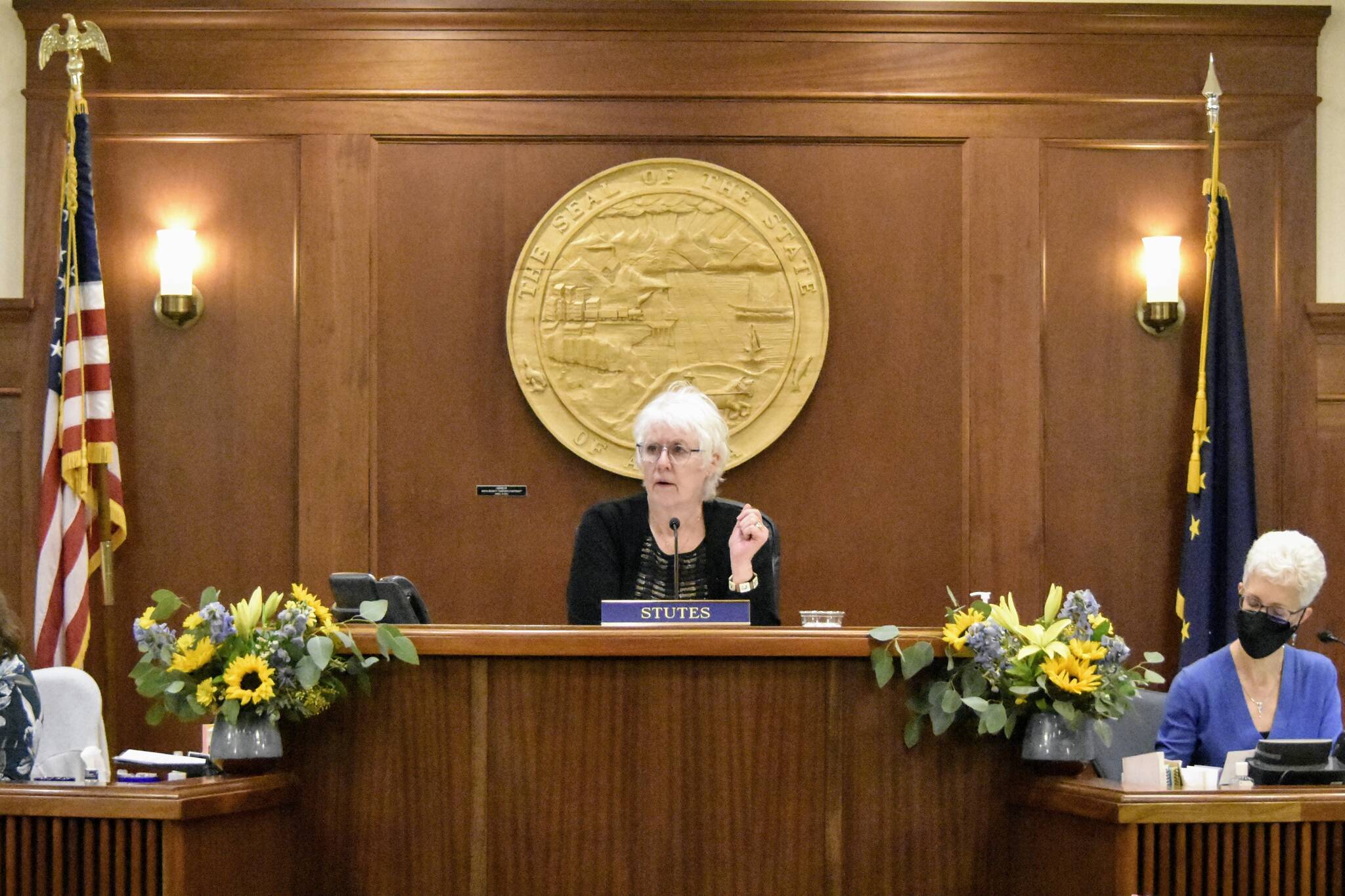Alaska’s lawmakers were back to business Tuesday, the first day of the legislative session, with many lawmakers commenting it felt as if they’d not been gone.
The session opened with calls for bipartisanship, but tensions were evident in the House of Representatives. Speaker Louise Stutes, R-Kodiak, began the session with a stern warning to lawmakers regarding their conduct on the floor.
“First and foremost, decorum will return to this House,” Stutes told the body. “Special orders will no longer be abused. Impugning members and impugning others will not be allowed.”
Speaking with reporters Tuesday afternoon, Stutes said her caucuses will focus on the budget and trying to avoid some of the issues that troubled last year’s session. But Stutes said her caucus, which includes most Democrats but also Republicans and independents, had been able to meet in the interim and was more cohesive than the previous session.
The House took 30 days to elect leadership last year, meaning legislative work couldn’t fully begin for about a month. That wasn’t an issue this year, Stutes said, and the caucus was more aligned on key issues. But the caucus holds only a slim majority of 21 lawmakers out of 40, enough to pass certain bills but not enough for others that require a two-thirds or three-quarter vote.
That became an issue last year when the House was able to pass a budget but failed to get the two-thirds vote necessary for the effective date clause. Without that clause, a bill goes into effect 90 days after its passage. But the state’s new fiscal year starts on July 1, and without a budget passed by the Legislature, the government faces the possibility of a shutdown.
“The only way we can avoid that is to get the budget passed sooner rather than later,” said House Majority Leader Chris Tuck, D-Anchorage.
[Permanent Fund Corp. board members defend CEO firing]
Political divisions in the Legislature last year took lawmakers through four special sessions, the most in Alaska’s state or territorial history, and despite calls for bipartisanship, there was evident skepticism from members of the House minority.
Speaking on the floor, Rep. Kevin McCabe, R-Anchorage, said he was disappointed the Legislative Council had declined to hear testimony Monday regarding the building’s COVID-19 mitigation policies and was refusing to hear more than one opinion.
“I think that we are going to watch carefully what the other side does,” McCabe said. “It needs to be two-sided.”
Dozens of bills were introduced Tuesday, but it’s unclear how many will pass. This is the last session before an election, meaning any bills that fail to pass both bodies will have to be resubmitted in the next Legislature.
At a news conference Monday, Gov. Mike Dunleavy said he hoped his proposed election bill would be addressed quickly by the Legislature.
Stutes said Tuesday the order in which bills were addressed was up to committee chairs, and she couldn’t say what might happen with the governor’s bill. But Tuck noted there were several elections bills in the Legislature, any of which could incorporate the governor’s policies.
“The governor’s ideas don’t have to be in the governor’s bill,” Tuck said.
On the floor of the Alaska State Senate, things were more subdued.
“What works best in the Senate is our ability to work across the aisle,” said Senate Minority Leader Tom Begich, D-Anchorage, on the floor. “My hope is over the next few months — and I’m praying that it will be a few months — we will actually be able to accomplish the tasks before us.”
Senate President Peter Micciche, R-Soldotna, told the Empire he’s hopeful lawmakers can make significant progress on delivering a long-term fiscal plan for the state.
One of last year’s special sessions saw the creation of a fiscal policy working group that wasn’t able to draft a plan itself but was able to some agreement on what would be necessary for a long-term fiscal plan. Micciche said he believed the Legislature could be able to deliver what he called the “lion’s share” of a fiscal plan.
“When I say lion’s share, I mean the legislation associated with putting us towards a better fiscal future,” Micciche said, which includes a spending limit, a sizable Permanent Fund Dividend and ways to fill any budget gaps that may remain.
Micciche said he believed the upcoming election would put pressure on lawmakers to deliver for Alaskans.
“I think Alaskans are watching,” he said. “They want us to deliver, that’s going to require that we get something done.”
In a statement shared with the Empire, Micciche added: “
“The passage and execution of a functional fiscal plan is a personal priority of mine. I believe most Senators feel similarly. The fiscal plan I envision would include a realistic spending limit, protection of the Permanent Fund, a Permanent Fund Dividend plan that satisfies the majority of Alaskans, and a method of filling any gaps potentially created by those funding decisions
“Alaska is an infant state that is blessed with infinite potential that is unrealized and will remain unrealized until we deliver the lion’s share of a long-term fiscal plan. Passing such a long-term plan will help move Alaska forward from the current economic roller coaster to a stable future path toward sustainability, good jobs, a blossoming economy and provide the Legislature with the time and energy to resolve Alaska’s many outstanding social and educational issues.”
• Contact reporter Peter Segall at psegall@juneauempire.com. Follow him on Twitter at @SegallJnuEmpire.

